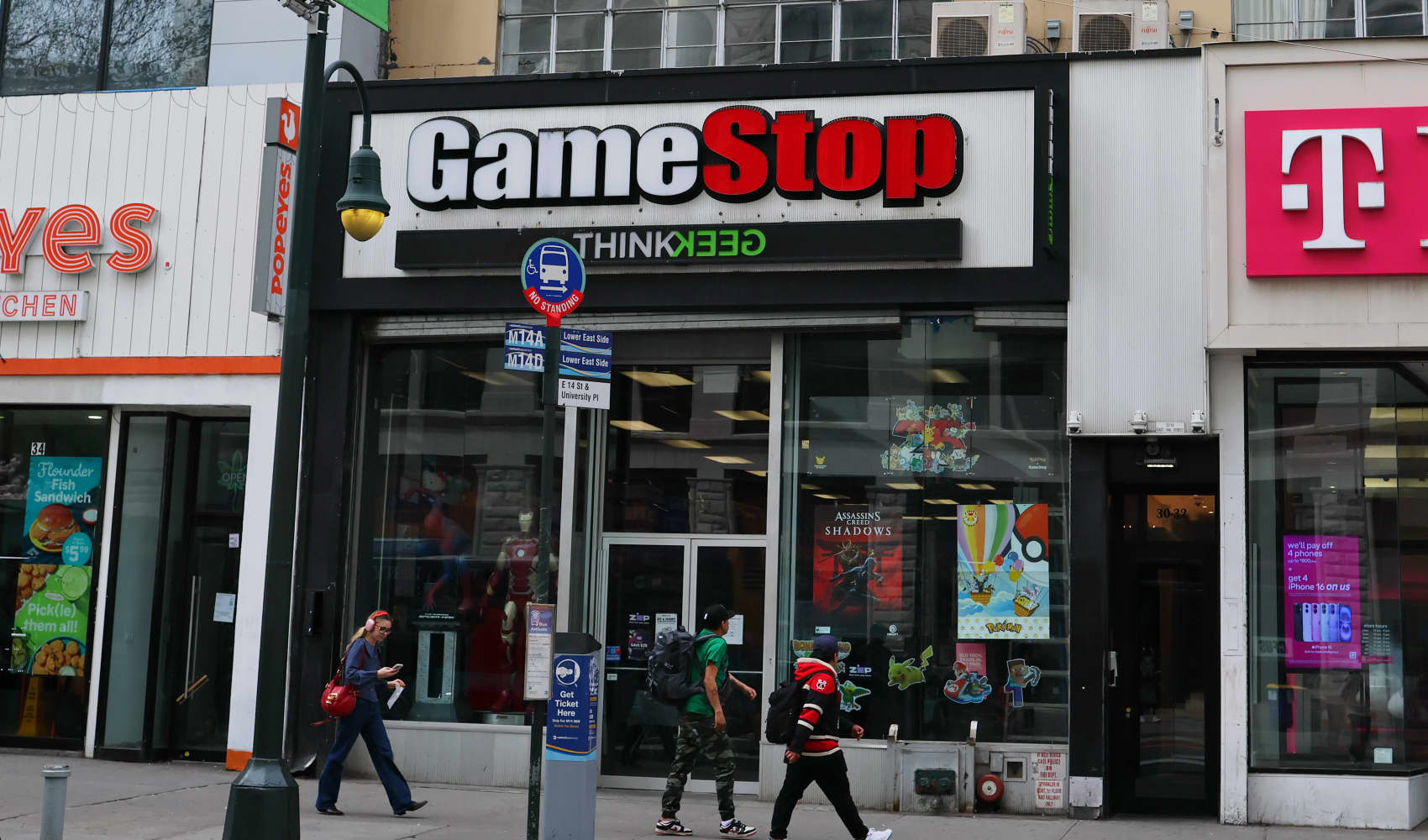GameStop’s shares tumbled over 15% after the retailer announced a $1.75 billion convertible bond offering to fund its aggressive Bitcoin purchase strategy, mirroring moves by companies like MicroStrategy. Analysts express skepticism as the company faces declining revenues and market uncertainty.
GameStop shares tank on convertible bond offering to potentially buy more bitcoin

Key Takeaways:
-
GameStop plans a $1.75 billion convertible bond offering to fund more Bitcoin purchases.
-
Shares dropped over 15% in premarket trading following the announcement.
-
The company previously bought 4,710 bitcoins, worth over half a billion dollars.
-
Revenue declined 17% year-over-year to $732.4 million in the fiscal first quarter.
-
Analysts express skepticism about the effectiveness of the Bitcoin investment strategy.
GameStop’s Bold Bitcoin Bet Sends Shares Plummeting
A Risky Move into Cryptocurrency
GameStop, the video game retailer known for its meme stock status, announced plans for a $1.75 billion convertible bond offering on Thursday. The company intends to use the net proceeds for general corporate purposes, including making investments aligned with its policy and potential acquisitions. A significant focus of this investment strategy is adding cryptocurrencies, particularly Bitcoin, to its balance sheet.
Last month, GameStop purchased 4,710 bitcoins, an investment worth more than half a billion dollars at the time. This bold move into the volatile world of cryptocurrency marks a substantial shift in the company’s financial strategy.
Market Reacts with Share Decline
The announcement prompted a swift reaction from investors. GameStop’s stock tanked more than 15% in premarket trading following the news of the bond offering. The decline reflects market concerns about the prudence of the company’s heavy investment in Bitcoin.
This drop adds to the 6% decrease in share value that occurred on Wednesday after GameStop reported its fiscal first-quarter earnings. The retailer experienced a 17% year-over-year revenue decline, dropping to $732.4 million, highlighting ongoing financial challenges.
Analysts Express Skepticism
Financial experts have voiced doubts about the effectiveness of GameStop’s cryptocurrency strategy. Michael Pachter, an analyst at Wedbush, reiterated his underperform rating on the company. He noted that the stock has “consistently capitalized on ‘greater fools’ willing to pay more than twice its asset value for its shares.”
Pachter further criticized the Bitcoin buying strategy, stating that it “makes little sense as the company, already trading at 2.4 times cash, isn’t likely to drive an even greater premium by converting more cash to crypto.” Such skepticism reflects broader concerns about the sustainability and rationale behind the retailer’s foray into cryptocurrency investments.
Following in MicroStrategy’s Footsteps
GameStop’s strategy mirrors that of software company MicroStrategy, now known as Strategy, which has become the largest corporate holder of Bitcoin after investing billions in recent years. Strategy’s decision to embrace Bitcoin prompted a rapid, albeit volatile, rise in its stock.
Like Strategy, GameStop is leveraging convertible debt to fund its Bitcoin purchases. However, the success of such a tactic remains uncertain, especially given the inherent volatility of cryptocurrency markets and the differing circumstances of the two companies.
CEO’s Perspective on Bitcoin Investment
Ryan Cohen, GameStop’s CEO, has defended the company’s shift toward cryptocurrency. He recently stated that the decision to buy Bitcoin is driven by macroeconomic concerns. Cohen views Bitcoin, with its fixed supply and decentralized nature, as a potential safeguard against certain risks.
“Bitcoin could serve as protection against certain risks,” Cohen emphasized, suggesting that the digital currency might offer a hedge in an unpredictable economic landscape.
Financial Challenges Ahead
Despite the bold investment, GameStop faces significant hurdles. The company’s declining revenue and the market’s lukewarm response to its cryptocurrency strategy raise questions about the path forward.
Analysts remain cautious, and the substantial drop in share value reflects investor uncertainty. As GameStop continues to navigate this new direction, the effectiveness of its Bitcoin bet—and its impact on the company’s financial health—remains to be seen.
Conclusion
GameStop’s aggressive move into Bitcoin represents a high-stakes gamble that has yet to convince the market or analysts of its merit. With declining revenues and a skeptical investor base, the retailer’s foray into cryptocurrency could either pave the way for a surprising turnaround or exacerbate existing financial woes.
As the situation unfolds, all eyes will be on GameStop to see if its bold strategy will pay off or if it will serve as a cautionary tale for other companies considering a similar path.











